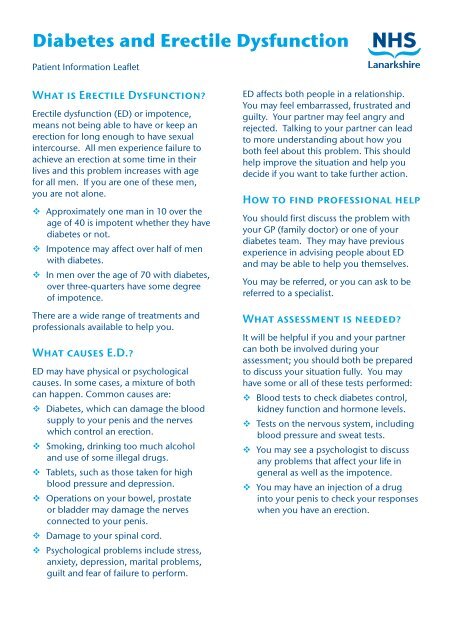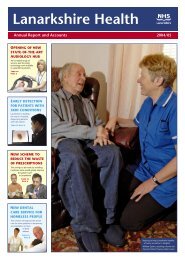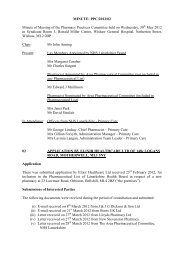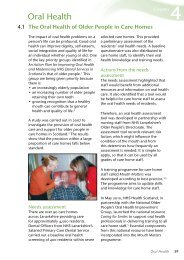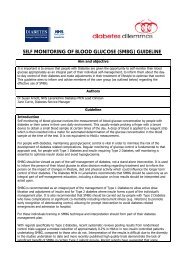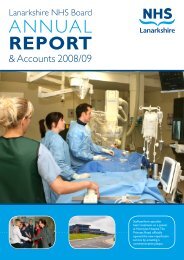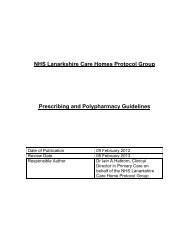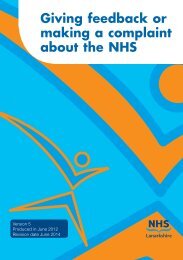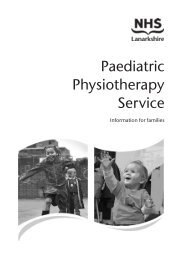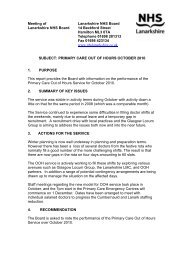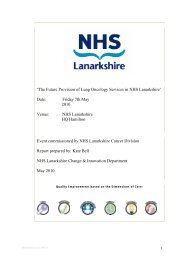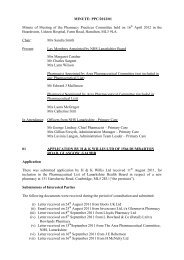Diabetes and Erectile Dysfunction - NHS Lanarkshire
Diabetes and Erectile Dysfunction - NHS Lanarkshire
Diabetes and Erectile Dysfunction - NHS Lanarkshire
Create successful ePaper yourself
Turn your PDF publications into a flip-book with our unique Google optimized e-Paper software.
<strong>Diabetes</strong> <strong>and</strong> <strong>Erectile</strong> <strong>Dysfunction</strong><br />
Patient Information Leaflet<br />
What is <strong>Erectile</strong> <strong>Dysfunction</strong>?<br />
<strong>Erectile</strong> dysfunction (ED) or impotence,<br />
means not being able to have or keep an<br />
erection for long enough to have sexual<br />
intercourse. All men experience failure to<br />
achieve an erection at some time in their<br />
lives <strong>and</strong> this problem increases with age<br />
for all men. If you are one of these men,<br />
you are not alone.<br />
v Approximately one man in 10 over the<br />
age of 40 is impotent whether they have<br />
diabetes or not.<br />
v Impotence may affect over half of men<br />
with diabetes.<br />
v In men over the age of 70 with diabetes,<br />
over three-quarters have some degree<br />
of impotence.<br />
There are a wide range of treatments <strong>and</strong><br />
professionals available to help you.<br />
What causes E.D.?<br />
ED may have physical or psychological<br />
causes. In some cases, a mixture of both<br />
can happen. Common causes are:<br />
v <strong>Diabetes</strong>, which can damage the blood<br />
supply to your penis <strong>and</strong> the nerves<br />
which control an erection.<br />
v Smoking, drinking too much alcohol<br />
<strong>and</strong> use of some illegal drugs.<br />
v Tablets, such as those taken for high<br />
blood pressure <strong>and</strong> depression.<br />
v Operations on your bowel, prostate<br />
or bladder may damage the nerves<br />
connected to your penis.<br />
v Damage to your spinal cord.<br />
v Psychological problems include stress,<br />
anxiety, depression, marital problems,<br />
guilt <strong>and</strong> fear of failure to perform.<br />
ED affects both people in a relationship.<br />
You may feel embarrassed, frustrated <strong>and</strong><br />
guilty. Your partner may feel angry <strong>and</strong><br />
rejected. Talking to your partner can lead<br />
to more underst<strong>and</strong>ing about how you<br />
both feel about this problem. This should<br />
help improve the situation <strong>and</strong> help you<br />
decide if you want to take further action.<br />
How to find professional help<br />
You should first discuss the problem with<br />
your GP (family doctor) or one of your<br />
diabetes team. They may have previous<br />
experience in advising people about ED<br />
<strong>and</strong> may be able to help you themselves.<br />
You may be referred, or you can ask to be<br />
referred to a specialist.<br />
What assessment is needed?<br />
It will be helpful if you <strong>and</strong> your partner<br />
can both be involved during your<br />
assessment; you should both be prepared<br />
to discuss your situation fully. You may<br />
have some or all of these tests performed:<br />
v Blood tests to check diabetes control,<br />
kidney function <strong>and</strong> hormone levels.<br />
v Tests on the nervous system, including<br />
blood pressure <strong>and</strong> sweat tests.<br />
v You may see a psychologist to discuss<br />
any problems that affect your life in<br />
general as well as the impotence.<br />
v You may have an injection of a drug<br />
into your penis to check your responses<br />
when you have an erection.
What treatments are available?<br />
Changing medication<br />
A change of drug or an additional<br />
prescription to remove the side effects of<br />
some medicines may be useful.<br />
Drug therapy<br />
Certain drugs are available on the <strong>NHS</strong> for<br />
men with diabetes <strong>and</strong> ED. They may not<br />
be suitable for you. Your doctor can give<br />
you further advice.<br />
Contact the:<br />
The Sexual <strong>Dysfunction</strong> Association,<br />
suite 301, Emblem House,<br />
London Bridge Hospital,<br />
27 Tooley Street, London, SE1 2PR.<br />
Helpline Tel: 0870 7743571<br />
Email: info@sda.uk.net<br />
Website: www.impotence.org.uk<br />
Self-injection therapy<br />
You can inject a drug into your penis<br />
before intercourse. This increases the<br />
blood supply in your penis to produce<br />
an erection.<br />
Vacuum therapy<br />
You place a tube (like a rigid condom)<br />
over your penis <strong>and</strong> use a pump to empty<br />
the air out of the tube. This causes blood<br />
to be drawn into your penis. You place a<br />
ring on the base of your penis to maintain<br />
your erection during intercourse. Vacuum<br />
Therapy is only available on the <strong>NHS</strong> to<br />
patients who meet certain criteria.<br />
Surgery<br />
Occasionally an operation is used to<br />
renew the blood supply to your penis or<br />
to implant a rod to make your penis erect<br />
for penetration.<br />
Impotence is now much better understood<br />
<strong>and</strong> treated than in the past. Help is<br />
available for you <strong>and</strong> your partner to find a<br />
way round this problem.<br />
Pub. date: June 2011<br />
Review date: June 2013<br />
Issue No: 01<br />
PIL.DIBEDF.77058.L<br />
Design - Medical Illustration, <strong>NHS</strong> <strong>Lanarkshire</strong>


